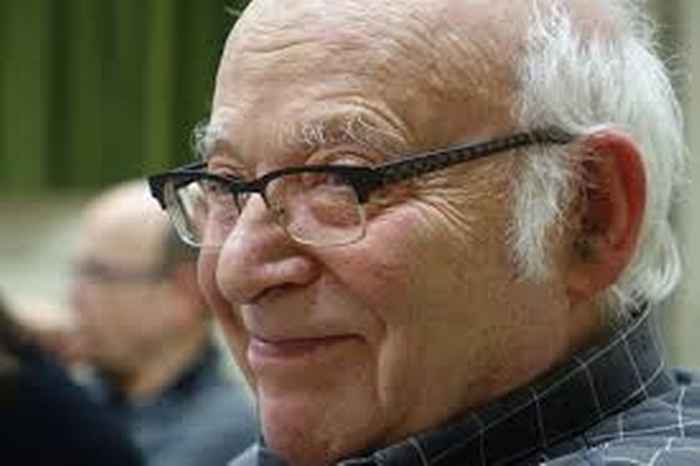Polyphony and Polyrhythm – A Week with Simha Arom
- Start date
- 24 October 2023
- End date
- 27 October 2023

Tuesday, October 24, 16:00 – 18:00 Filmscreening
University Theatre, Nieuwe Doelenstraat 16-18, room 301
Projection of the 78-minute documentary Simha (2015) by Jérôme Blumberg
(registration required via s.muziekwetenschap@uva.nl)
Simha Arom will join the screening and answer questions from the audience.
Wednesday, October 25, 14:00 – 18:00
University Theatre, Nieuwe Doelenstraat 16-18, room 101A
Encoding Polyphony – Symposium in honor of Simha Arom
(participation is free upon registration via j.j.e.kursell@uva.nl)
Program
14:00 (doors open, coffee)
14:30 Julia Kursell: Welcome and Introduction
Decoding Polyrhythm and Polyphony – Simha Arom’s Work on Notating, Visualizing and Understanding Complex Polyphony
Simha Arom’s work in the field of musicology bridges between the fields we are interested in at the University of Amsterdam in musicology: cultural musicology, cognitive and computational musicology, and the Western tradition of composed music up until today. His work shows us how many burning questions of today’s research can be tackled. Can the ethnographer interact with those musicking while not imposing a hierarchy between the researcher and the musicking subject? Is musical literacy a specificity of Western music – and how does musical knowledge relate to this assumption? How can the study of music contribute to other fields, be it linguistics, anthropology, or computational modelling, among others? The introduction contextualizes Arom’s work in some strands of the history of the humanities and sciences. It will pay special attention to his work on and with musical notation.
15:15 Christoph Finkensiep:
Beyond Voices: a New Take on Polyphonic Structure in Western Tonal Music
A rich and complex polyphonic structure is often taken to be one of the foundations of the Western tonal tradition. In the usual understanding, polyphony is thereby based on a set of concurrent voices, each of which has its own identity and interacts with the others. This notion is challenged by a number of phenomena in free polyphony (i.e. music without explicit voices), but also in monophony and explicit polyphony. This talk puts forward the argument that polyphony is better understood as a network of functional relations. A formal model of this network and a corresponding notation are presented that can express phenomena such as implicit polyphony, the realization of latent structures (e.g., harmonies and schemata), and the origin of harmonic syntax in voice leading.
16:15 Coffee break
16:30 Frank Scherbaum:
Searching for Structural Patterns in Traditional Georgian Vocal Music: From Visual Analysis to Generative Grammars
This presentation will report on an ongoing collaboration with Simha Arom to study the ‘grammar’ of Georgian traditional vocal music. The aim of this work is to investigate what can be learned from the analysis of musical scores in this context. To this end, two complementary conceptual strategies were used, one graphical and the other algorithmic. Most graphical approaches are very efficient when it comes to visual analysis of individual songs. However, for the analysis of song collections, the use of algorithmic approaches is essential. Therefore, numerous natural language processing (NLP) tools such as n-grams, Kohonen's self-expanding grammar, and Generative Pretrained Transformer (GPT) networks have been investigated for corpus analysis. Training a generative language model on our whole corpus shows that - despite the small size of our corpus - the structure of the resulting embedding space of the GPT network already shows signs of semantic structures (learned from syntax).
(ca. 17:30-18:00 end)
Thursday, October 26, 16:30 – 18:30
African Polyrhythm in the Work of György Ligeti
Lecture demonstration with Simha Arom and percussion ensemble led by Julien André University Theatre, Nieuwe Doelenstraat 16-18, Theatre Hall
16:30 (doors open)
17:00 start of the lecture
Entrance is free
(online registration is required via this link)
Composer György Ligeti (1923-2006) was fascinated by the richness and complexity of the polyrhythms of sub-Saharan Africa, which he discovered in the early 1980s through the research of Simha Arom. Through the deconstruction and subsequent reconstruction of the emblematic Malinke piece Konowule —and with the participation of Julien André’s five percussionists and dancer Aminata Traoré— this lecture-demonstration will introduce the principles underlying this process. At the same time, it will explain step by step how these principles have been integrated and expanded in Ligeti's work.
Friday, October 27, 14:00 – 17:00
Workshop with invited guests of the NWO-OC project Unraveling our Capacity for Music
(Participation by invitation only)
Institute for Advanced Studies, Oude Turfmarkt 145-147, Amsterdam.
Participants: prof. dr Karline Janmaat (UvA-IBED), prof. dr Henkjan Honing (UvA-MCG), dr Makiko Sadakata (UvA-MCG), Jiaxin Li (PhD candidate, UvA-MCG), Dave Baker (postdoc, UvA-MCG), Parsa Jouyan (MA Music Studies), Frans van Schaik (MSc Biology), <vacancy> (MSc Biology), and guests.
Guests: prof. dr Simha Arom (CNRS), prof. dr Julia Kursell (Music Studies)
In this meeting the research group will present its current plans for one the work packages of the NWO-OC project on Musicality, plans that were reformulated last year at a kick-off meeting in Amsterdam [1], and that since then have resulted in a number of pilot studies in preparation of a field trip to Congo [2]. This presentation will be followed by a discussion with all contributors, and invited responses by our guest Simha Arom.
[1] https://www.mcg.uva.nl/wp3/
[2] https://pure.uva.nl/ws/files/117276927/Honing_NWO_OC_Proposal_2022.pdf